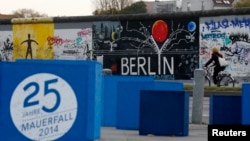On Nov. 9, 1989, when residents of East and West Berlin breached the wall that divided their city for three decades, it was an image seen around the globe.
Not so in communist East Germany’s close ally, North Korea.
At that time Park Gun-ha was in his mid 20s and completing his military service in the North. He says very little information about Germany’s reunification made it through.
We were not told why the two Germanys reunified, Park says. He recalls that North Korean media portrayed the fall of the wall as the result of corrupt opportunists in East Germany. Park says it was not until he defected to South Korea in 2005 that he learned the full story.
Cold War legacy
The division of the Korean peninsula is a lasting legacy of the Cold War. Thousands of families remain separated by the demilitarized zone, cross-border dialogue is scarce, and military tensions often run high.
But some observers say Germany’s experience could help guide both Koreas to eventual reunification.
Bernhard Seliger, head of the German Hanns-Seidel Foundation in Seoul, said, "Germany certainly is an interesting case to look at. There are not many successful unifications and few that happened peacefully. In that sense its understandable that the Koreans look at Germany.”
But Seliger says there are as many differences in the German and Korean situations as there are similarities.
For instance, there is greater economic disparity between the two Koreas than in divided Germany. There is a lack of shared institutions, like German churches. And, unlike Western Europe at the time, there are many unresolved territorial and historical disputes among countries in northeast Asia.
New problems, too
Seliger notes that Germany's unification created new problems for the country.
It took many years to overcome wealth and cultural gaps between the East and West. He says those difficult times made South Koreans leery of German-style integration at first.
“I saw times, 10-15 years ago ... that South Koreans said, certainly we don’t want to go the German way. It leads to massive economic challenges. It leads to internal rifts," Seliger says.
He says it took about two decades for most of the inequalities between eastern and western Germany to disappear.
But Seliger and other Korea-watchers note that the potential costs of unification here make many younger South Koreans uninterested in uniting with the North.
Disinterest not surprising
Lars-André Richter, head of the Seoul-based Friedrich-Naumann Foundation for Freedom, says after nearly 70 years of division, that disinterest might not be surprising.
“They are too young to remember, even their parents are too young to remember the undivided Korea. You lose the emotional link," Richter says.
Richter says that is unlike in Germany, where national division lasted about 40 years.
North Korean defector Park, who now works for an association of former North Korean government officials in Seoul, is not so sure if German unification is the right model for Korea.
He points out that East German leaders agreed to reforms before the nation was absorbed by the West. Such a move is considered impossible in today's North Korea.
Park says it would be an ideal situation if the North Korean government becomes more democratic and peacefully moves toward reunification, but that is not likely to happen. Pyongyang will not give up its power, he says.
Park adds that like Germany, unification on the Korean peninsula will suddenly happen - but only after North Korea collapses.







